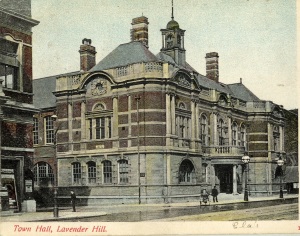The Battersea Borough Council meeting of 7 June started by acknowledging the death of Lord Kitchener, and expressed their sorrow at his loss by all standing as a mark of respect. The meeting then moved on to discuss the Council and Military Service, and how to deal with potential exemptions from military service.
Three clerks of military age in the Council had received complete exemption from military service, on account of being indispensable. Overall there were 28 officers and clerks of military age working at the municipal buildings (Battersea Town Hall), 17 of whom were permanent and had occupation based exemption. Three temporary clerks were medically unfit to service, and one had actually been discharged as medically unfit. There were 5 who were not yet called up – either due to only just being 18 or to being in later groups under the Derby scheme. It was argued that there was a great deal of extra work in the Council due to pressures from government and that there was no doubt that all the men who had obtained exemptions could not be spared. Eight of the permanent staff in the borough accountant’s office had joined the army, and six from the Town Clerk’s department, with six exemptions granted across both offices. Exemption certificates had been obtained directly from the recruiting officer, rather than going before a tribunal – a fact which caused some controversy as the Councillors (9 of whom also made up the tribunal members) felt that exemption was a personal matter which should be dealt with by each man individually and they did not wish the employees of the Council to receive special privilege.
The Council had already decided that employees who wished to serve should gain the permission of the Council to do so, and at this meeting they granted that permission to E T Taylor, a temporary clerk in the Town Clerk’s office, and W Worrell, a sewer flusher. Presumably the loss of the clerk made it even more important that they were able to keep the remaining staff in order to carry out the work of the Council.
The Tribunals this week, as reported in the South Western Star, appear to have been granting more exemptions than usual – although the corresponding minutes show that this was not the case and the majority of cases were disallowed. W J Baldwin of Rollo Street was a widower with one child, who claimed he would have to sell his home to ensure they were looked after – and that he objected to vaccination. The Tribunal said that his child would be cared for by the country if he went and disallowed his claim, the Star headlined this with “The Poor Law for a Soldier’s Child”.
Battersea Borough Council minutes, ref: MBB/1/16
Battersea Military Service Tribunal minutes, ref: MBB/2/25/2
South Western Star available on microfilm


